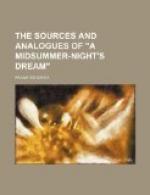Hop and Mop and Drop so clear,
Pip and Trip and Skip that were
To Mab, their sovereign, ever dear,
Her special maids
of honour;
Fib and Tib and Pink and Pin,
Tick and Quick and Jill and Jin,
Tit and Nit and Wap and Win,
The train that
wait upon her.
Upon a grasshopper they got
And, what with amble and with trot,
For hedge nor ditch they spared not,
But after her
they hie them;
A cobweb over them they throw,
To shield the wind if it should blow;
Themselves they wisely could bestow
Lest any should
espy them.
But let us leave Queen Mab awhile
(Through many a gate, o’er many
a stile,
That now had gotten by this wile),
Her dear Pigwiggen
kissing;
And tell how Oberon doth fare,
Who grew as mad as any hare
When he had sought each place with care
And found his
Queen was missing.
By grisly Pluto he doth swear,
He rent his clothes and tore his hair,
And as he runneth here and there
An acorn cup he
greeteth,
Which soon he taketh by the stalk,
About his head he lets it walk,
Nor doth he any creature balk,
But lays on all
he meeteth.
The Tuscan poet doth advance
The frantic Paladin of France,[6]
And those more ancient do enhance
Alcides in his
fury,
And others Ajax Telamon,
But to this time there hath been none
So bedlam as our Oberon,
Of which I dare
assure ye.
And first encount’ring with a Wasp,
He in his arms the fly doth clasp
As though his breath he forth would grasp
Him for Pigwiggen
taking:
“Where is ny wife, thou rogue?”
quoth he;
“Pigwiggen, she is come to thee;
Restore her, or thou diest by me!”
Whereat the poor
Wasp quaking,
Cries, “Oberon, great Fairy King,
Content thee, I am no such thing:
I am a Wasp, behold my sting!”
At which the Fairy
started;
When soon away the Wasp doth go,
Poor wretch was never frighted so;
He thought his wings were much too slow,
O’erjoyed
they so were parted.
He next upon a Glow-worm light
(You must suppose it now was night),
Which, for her hinder part was bright,
He took to be
a devil,
And furiously doth her assail
For carrying fire in her tail;
He thrasht her rough coat with his flail;
The mad King feared
no evil.
“Oh!” quoth the Glow-worm,
“hold thy hand,
Thou puissant King of Fairy-land!
Thy mighty strokes who may withstand?
Hold, or of life
despair I!”
Together then herself doth roll,
And tumbling down into a hole,
She seemed as black as any coal;
Which vext away
the Fairy.
From thence he ran into a hive:
Amongst the bees he letteth drive,
And down their combs begins to rive,
All likely to
have spoiled,
Which with their wax his face besmeared,
And with their honey daubed his beard:
It would have made a man afeared
To see how he
was moiled.




